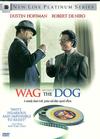 Cast: Robert DeNiro (Conrad Bean), Dustin Hoffman (Stanley Motss), Ann Heche (Winifred Ames)
Cast: Robert DeNiro (Conrad Bean), Dustin Hoffman (Stanley Motss), Ann Heche (Winifred Ames)Director: Barry Levinson
Genre: Political Satire
Political movies are always the hardest to show the public with the expectation that the film will receive a decent amount of attention. I often think that political movies have a limited audience even though their writers are probably aiming for everyone as an audience. Wag the Dog is about the only political film I can think of that has received a deserved amount of attention (JFK doesn’t count). Of course, it had a lot of indirect help from the Clinton administration even though it had nothing to do with Clinton. What makes this film stand out, other than similarities between the scandal of the fictional president of the movie and the Monica Lewinski scandal of Bill Clinton, is the thought the movie leaves the audience at the end. If one part of the story can actually happen, as Mr. Clinton proved to us, then what about the other half? I can't imagine anyone reading this blog passage, whether they're politically oriented or not, not ever hearing about this movie. There are only eleven more days until the Presidential election and the President has been caught with his pants down-literally. He has been accused of sexual misbehavior with a teenage girl in the oval office. A top presidential advisor contacts a Hollywood producer to help create a fake war between the U.S. and Albania in order to distract voters through the media in order that the President can appear heroic than horny and win the election. The director and presidential advisors go all out and cover all bases in order to get the public eye off the President's picadillos and focus on his heroic achievements in the phony war. A handful of Presidential advisors and one Hollywood director take the entire U.S. for a ride.
The whole film gave new meaning to the words "conspiracy theory". I really liked the attention it gave to the purpose of media. Not only was it timely with Clinton’s scandal, but it showed just how much the media fuels the public, who in return, fuel the media. The portrayal of media influence is straight forward, scary, and drives the movie’s audiences to anger. (Here I recommend the book MultiMedia Unlimited by Todd Gitlin- a Journalism Professor at Columbia University). Aside from a few rough words, this film is highly recommended, especially for the political science student.
No comments:
Post a Comment